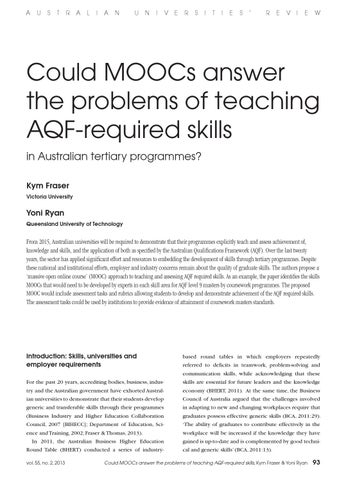A
U S T
R
A
L
I
A
N
U N
I
V
E R
S I
T
I
E S
’
R
E V
I
E
W
Could MOOCs answer the problems of teaching AQF-required skills in Australian tertiary programmes? Kym Fraser Victoria University
Yoni Ryan Queensland University of Technology
From 2015, Australian universities will be required to demonstrate that their programmes explicitly teach and assess achievement of, knowledge and skills, and the application of both as specified by the Australian Qualifications Framework (AQF). Over the last twenty years, the sector has applied significant effort and resources to embedding the development of skills through tertiary programmes. Despite these national and institutional efforts, employer and industry concerns remain about the quality of graduate skills. The authors propose a ‘massive open online course’ (MOOC) approach to teaching and assessing AQF required skills. As an example, the paper identifies the skills MOOCs that would need to be developed by experts in each skill area for AQF level 9 masters by coursework programmes. The proposed MOOC would include assessment tasks and rubrics allowing students to develop and demonstrate achievement of the AQF required skills. The assessment tasks could be used by institutions to provide evidence of attainment of coursework masters standards.
Introduction: Skills, universities and employer requirements
based round tables in which employers repeatedly referred to deficits in teamwork, problem-solving and communication skills, while acknowledging that these
For the past 20 years, accrediting bodies, business, indus-
skills are essential for future leaders and the knowledge
try and the Australian government have exhorted Austral-
economy (BHERT, 2011). At the same time, the Business
ian universities to demonstrate that their students develop
Council of Australia argued that the challenges involved
generic and transferable skills through their programmes
in adapting to new and changing workplaces require that
(Business Industry and Higher Education Collaboration
graduates possess effective generic skills (BCA, 2011:29).
Council, 2007 [BIHECC]; Department of Education, Sci-
‘The ability of graduates to contribute effectively in the
ence and Training, 2002; Fraser & Thomas, 2013).
workplace will be increased if the knowledge they have
In 2011, the Australian Business Higher Education Round Table (BHERT) conducted a series of industryvol. 55, no. 2, 2013
gained is up-to-date and is complemented by good technical and generic skills’ (BCA, 2011:13).
Could MOOCs answer the problems of teaching AQF-required skills, Kym Fraser & Yoni Ryan
93
